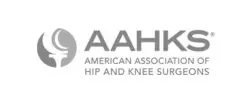Arthritis affects millions of Americans. As the population ages and as older people continue to engage in high-level physical activity, the disease burden of arthritis has never been as high as now, nor has the demand for joint replacement.
Unfortunately, arthritis has no one specific cause and no reliable cure. Although biological changes happen in the joint that leads to cartilage destruction, mechanical changes happen to the arthritic joint which limits the success of any biologically based therapy. These include bone spurs, limb deformity, soft-tissue contracture, and erosion of joint surfaces.
Arthritis is a progressive degenerative process that leads to pain, stiffness, and weakness. These symptoms, in turn, limit a patient’s ability and desire to engage in physical activities that stress the arthritic joint. As a result, people with arthritis begin to avoid activities that they normally either need or want to do.
Joint replacement, while not an actual cure, resurfaces the worn joint which restores comfort, function, and the ability to return to the vast majority of activities. To achieve a high level of function after joint replacement requires commitment on the patient’s part to perform the necessary rehabilitation. This takes time and dedication that patients must be willing to follow through on.
Deciding when to proceed with joint replacement is a common question we are asked by patients who are on the fence about surgery. As follows are 5 signs that generally indicate you are ready.
- Your symptoms are significant enough to mandate an intervention. If you are still getting around reasonably well and not significantly limited by pain and loss of function, you should consider waiting until things get worse. The worse you get, the larger your margin for improvement.
- Your quality of life is substantially impaired by the symptoms. Health-related quality of life improvement is a medical metric that can measure the value of treatment like joint replacement. As mentioned above, the more your quality of life is impaired, the more likely the procedure will provide value.
- You have maximized conservative treatment options. If you have not tried standard conservative options like over-the-counter medications, exercises, and injections, it makes sense to try these and other non-surgical treatments prior to advancing directly to surgery.
- Your overall health and wellness status support safe surgery and gainful rehabilitation. Surgery is not without risk and risk factors include obesity, poorly managed health conditions, poor nutrition, smoking, untreated sleep apnea, and others. You should make every effort to optimize your health and nutritional status prior to undergoing surgery.
- You are willing and able to dedicate a fixed period of time and effort to do the work necessary to recover. Recovery from surgery is not automatic and you have to work for the outcome you want to achieve. If you are not able to commit this effort then it is best to wait until you can.
While modern surgical techniques and better pain management have accelerated the recovery from joint replacement surgery, it still requires perseverance on the part of the patient to achieve a great outcome. It is a team effort that involves both the patients, physician, care team, family, and friends. Our AVATAR program is designed to optimize the chances of success. Read more about this process on our website.
Contact us for knee or hip replacement surgery in New Hampshire.














